From teenage mod to Lambretta racer

Growing up as the son of a die-hard Teddy Boy, scooters were a complete mystery to a teenage Shaun Fairhead.
That all changed when, at 16, he stood and watched the floats drive past for the 1980 May Day parade in his home city of Ely.
“In my last few years at school I was into rock and roll like my dad, and had no idea what mods and scooters were,” he says.
“Then at the very back of all the floats was a band playing, with 20 or 30 scooters riding behind. It was the first time I’d ever seen anything like that, and I was gobsmacked.
‘I want to be a mod’
“I said to my mate ‘oh my God, what are they?’ and he said ‘they’re mods’. I looked and just said ‘I want to be a mod’.”
Now 59, Shaun has since owned hundreds of scooters, and has morphed from the mod of his early scootering days to a sprint and circuit racer and Lambretta tuning specialist.
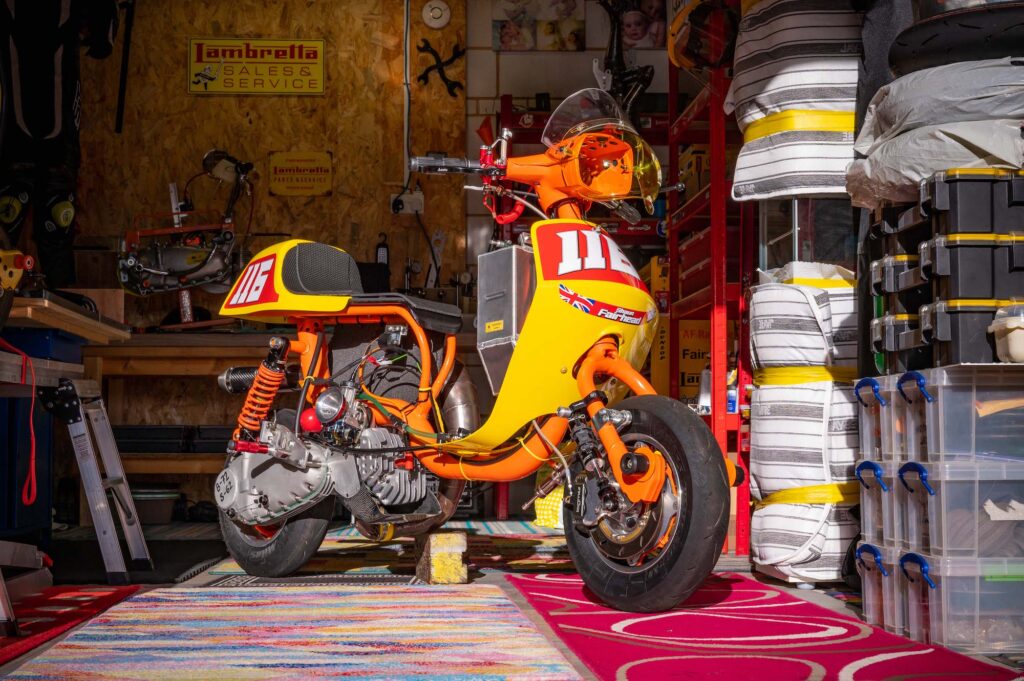 Shaun’s Lambretta racer
Shaun’s Lambretta racer
He runs his own Lambretta engine business, Fairspares, and has plans to compete for Lambretta top speed records in 2024.
It’s all a far cry from the boy who had to save up for a year to buy his first scooter, a red and chrome Vespa SS180, disappointing his dad in the process.
“He wasn’t too chuffed,” he laughs, paying £200 for the Vespa saved from his part-time, 50p-an-hour job while studying woodworking at Wisbech College.
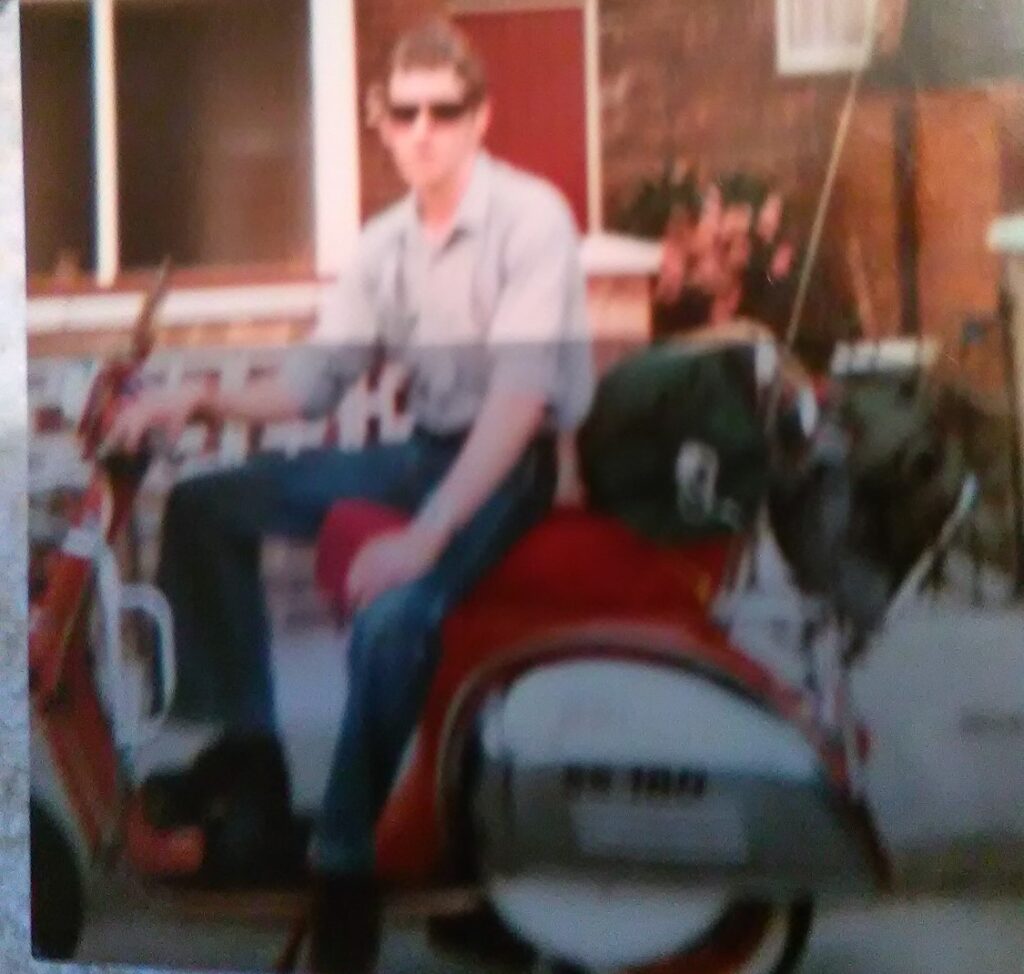 Shaun on the Vespa SS180 in 1981
Shaun on the Vespa SS180 in 1981
“I learned how to ride it, but I was clueless about everything else. I remember the clutch cable went and I put it into Ken Covell’s motorcycles in Ely. They charged me something like 50p for the cable, and £10 for labour, which was a lot of money then – 20 hours part time work for me.”
If he wanted to run an old scooter, he needed to learn how to repair it himself.
“I bought a non-running Vespa GS160 for £30, and a Haynes manual, and stripped it down,” he says. “That was my first introduction to messing with scooters. I didn’t have a clue what I was doing, but I learned how to put things back together. It was too rotten to restore though, so it ended up in a scrapyard.”
Immersed in scooter scene
Throughout the early ‘80s, Shaun immersed himself in the burgeoning scooter scene during the so-called ‘mod revival’.
His first scooter rally was at Skegness in September 1981, after something of a false start.
“I went to meet everybody on the marketplace on the Saturday morning and nobody turned up,” he laughs. “I didn’t know, but at the youth club the Thursday before they’d decided they weren’t going to go. But I was there ready with my sleeping bag, so I just went on my own.
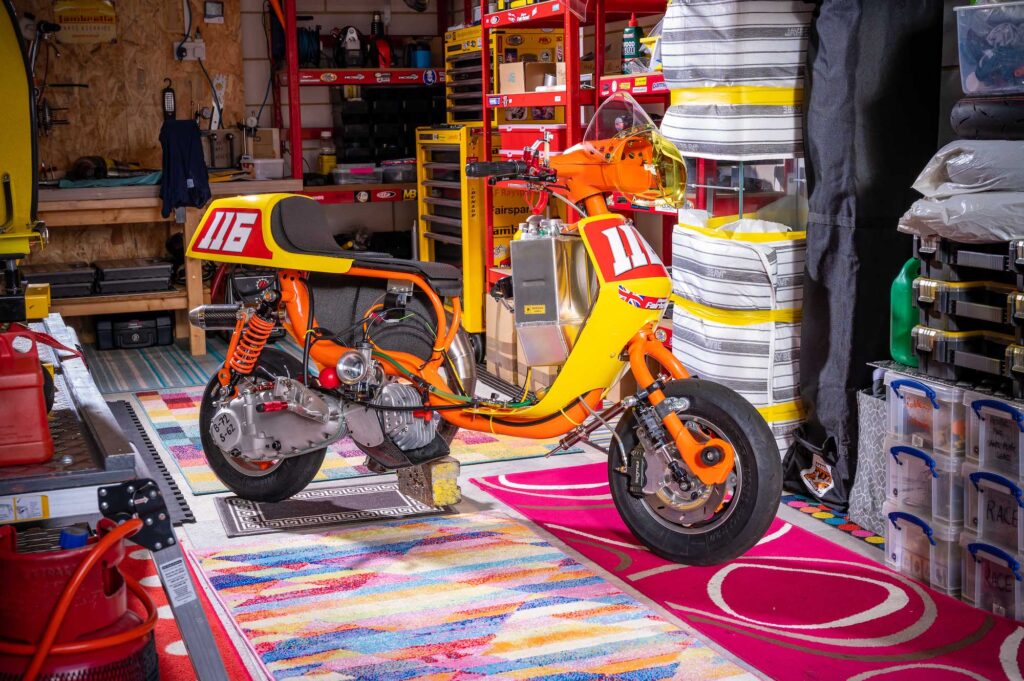
“I turned up at Skegness and I didn’t know anyone, but because mine was an older Vespa it got quite a lot of interest, and a group from the Norwich Broadsmen scooter club grabbed me and said ‘who are you with?’ I said I was on my own, and they said ‘hang around with us’, and that was that. We slept on deck chairs on the seafront.
“That was it, I was hooked then. I just loved it and I went all over the country with a group of friends from the scooter club in Ely. There were six to 10 of us, I’m still friends with most of them, and most of them still have scooters.
“I was willing to go anywhere on my scooter, I didn’t care, up to Scotland, down to the south coast, wherever. I remember a group of 20 of us went from Ely to Great Yarmouth, our local rally. There were a few lads with Vespa 50s, and I think it took us eight to 10 hours to do an hour and a half journey because everybody kept breaking down. That was the worst journey on a rally ever.”
With the Vespa and the mod uniform of parka, Fred Perry, and Sta-Prest trousers, Shaun had to run the gauntlet of bikers in the Cambridgeshire towns and villages around Ely.
Chain-swinging rockers
“In those days you had to avoid Soham,” he remembers. “Plenty an Ely mod was kicked off into ditches driving through Soham.
“I remember getting chased coming through Southery, near Downham Market, by two rockers in a car swinging a chain at me out of the window. It was only a few months after I got my first Vespa, and I just used to love going for a ride in the countryside – it was freedom, but you had to be careful.
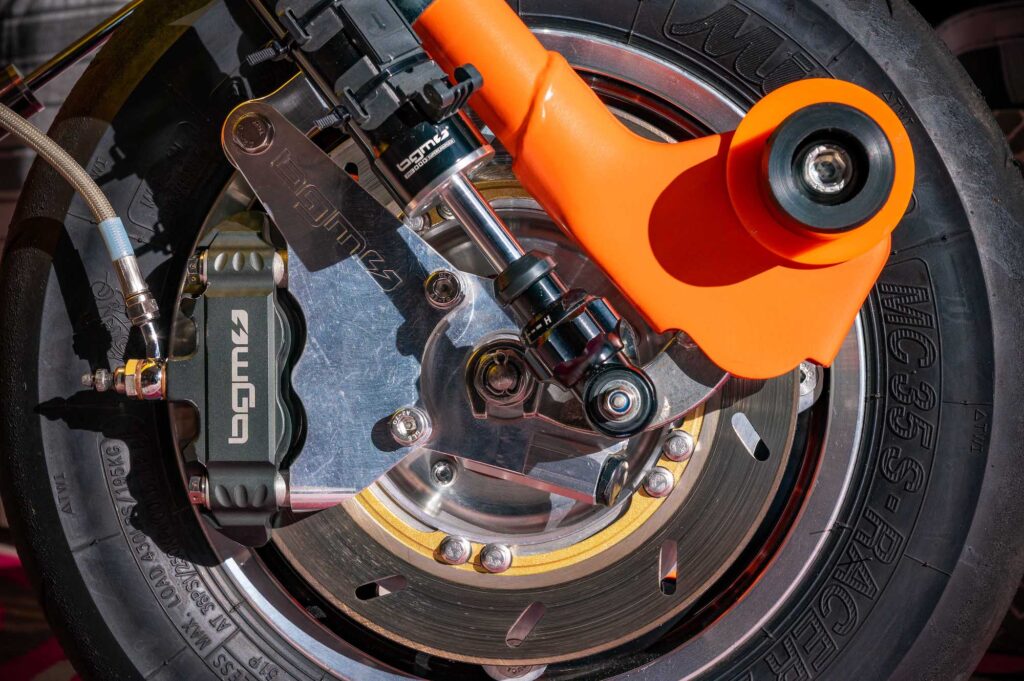 Serious disc brakes on Shaun’s racing Lambretta
Serious disc brakes on Shaun’s racing Lambretta
“It was a really good time to grow up though – you had punk rockers, skinheads, mods etc, a wide range of youth cultures to choose from. It was a brilliant time, and a bizarre time.
“The Lakenheath and Mildenhall skinheads used to come over to Ely to fight. They’d ring the telephone on the marketplace and say ‘get all the mods out, we’re coming over’.
“I remember a rockabilly lad jumping on top of one of their Transit vans dancing to Gene Vincent or something, while everyone else was fighting.”
Once he’d finished college and started work, Shaun had more money to indulge his passion for scooters, and got increasingly interested in the engines.
Fascinated by tuning
“I soon realised I liked the tuning side more than the mod side,” he says. “Although I loved the mod side of it, I found I was more drawn to making scooters go faster. I was fascinated by it.
“I remember one day there were a few of the slightly older scooter lot in Ely, more scooterists than mods, and two of them turned up with AF Rayspeed S-Type Lambrettas, with metal flake paint and tuned up 250s with big open carbs on them.
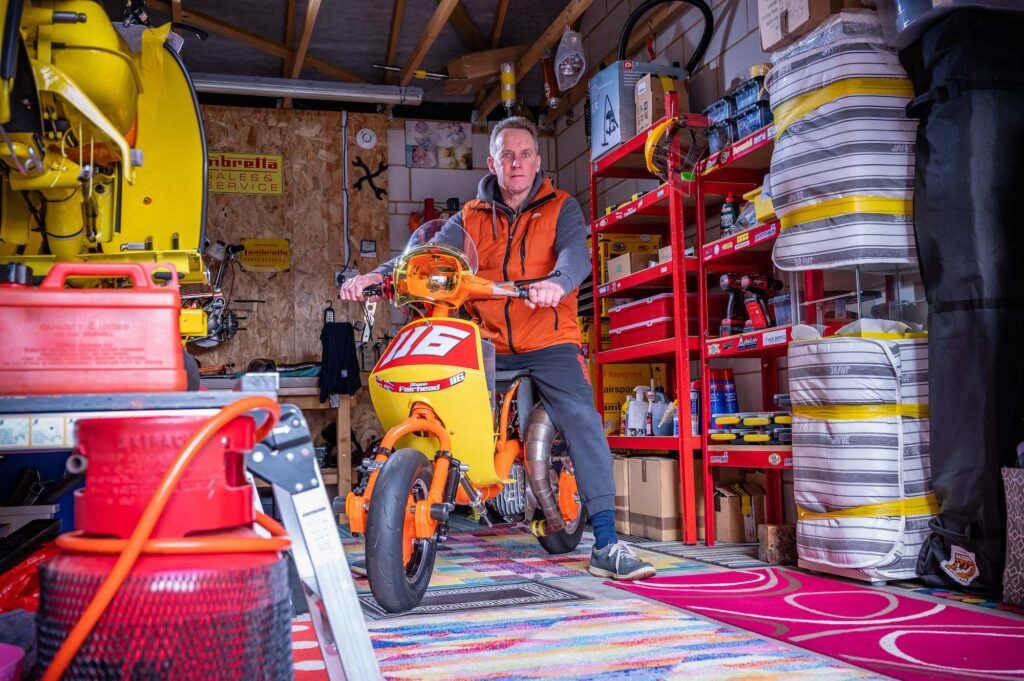
“They came up through the town and, if they opened up, they just roared and I was like ‘oh my God, that’s what I want to do – I want a Lambretta that roars’. That really got my buzz going for the mechanical and tuning side.”
At the time, it was easy to pick up scooters for the cost of a night in the pub today, and Shaun found it hard to resist building up a sizable collection.
“I think at one point I owned about 36 scooters,” he laughs. “They were kept in a couple of garages me and a few friends rented.
Cheap scooters
“I would get offered them, ‘oh go on then’, because you could pick them up cheap – £30 to £50. They were just hidden in people’s sheds and stuff, parents or grandparents had had them and just put them away.
“Then I’d sell them on and try to make money, or strip them down for parts to keep others going. I bought a few for just the number plates to sell.
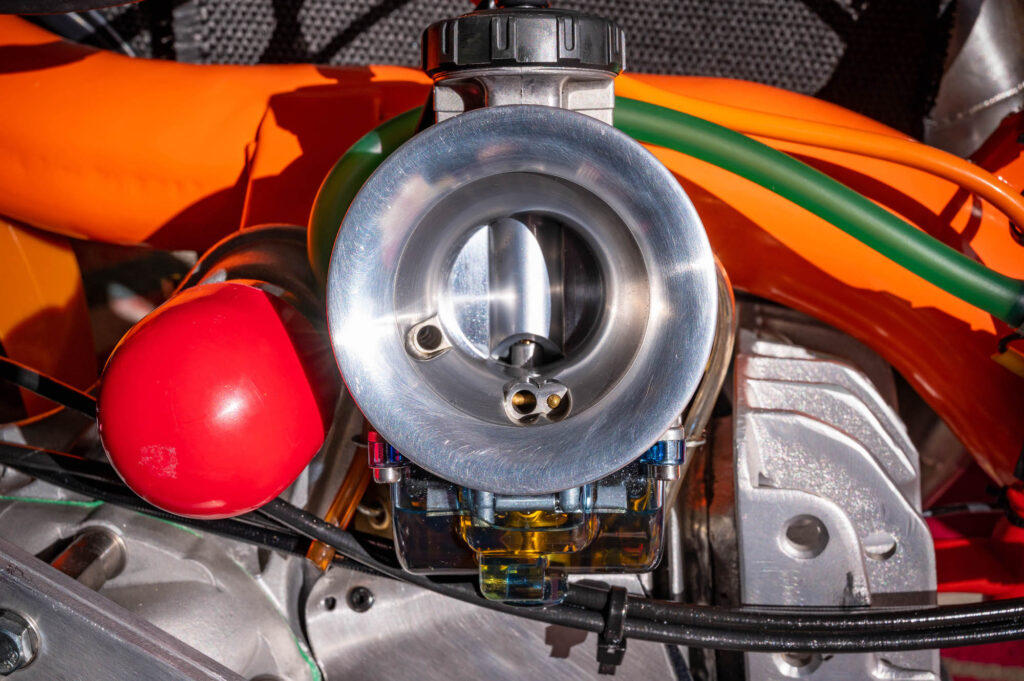
“I had a couple of TV200s, which are worth a fortune now, and I stripped them, sold the bits, scrapped the frames and sent the log books off as scrap. Just a frame now is worth a few grand, but they weren’t really sought after in the 80s.
“I started tuning anything I had, and once I’d learned the mechanical side then everyone would start bringing their scooters to me. Someone would say ‘can you put a 200 kit, can you do a bit of porting, can we put a bigger carb on, let’s see what happens’. And it just took off from there.”
GP200 survivor
Of all those scooters from the ‘80s, one remains – a 1970 Lambretta GP200 bought in 1983 that is currently undergoing restoration.
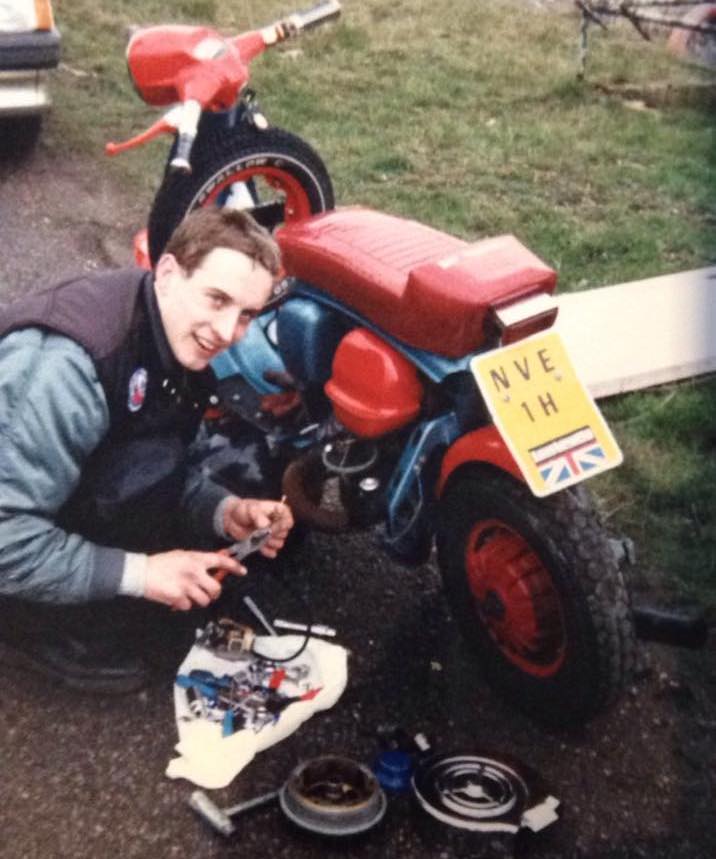 On a scooter rally at Great Yarmouth with NVE 1H
On a scooter rally at Great Yarmouth with NVE 1H
“That one has always been there,” says Shaun, “and it’s got a bit of sentimental value because of that.
“It’s had lots of changes over the years, probably 30 different engines in it and all sorts. It was Italian originally, but I cut the frame down, so now it’s got an Indian frame. I wish I hadn’t done that, but it wasn’t sought after in those days.
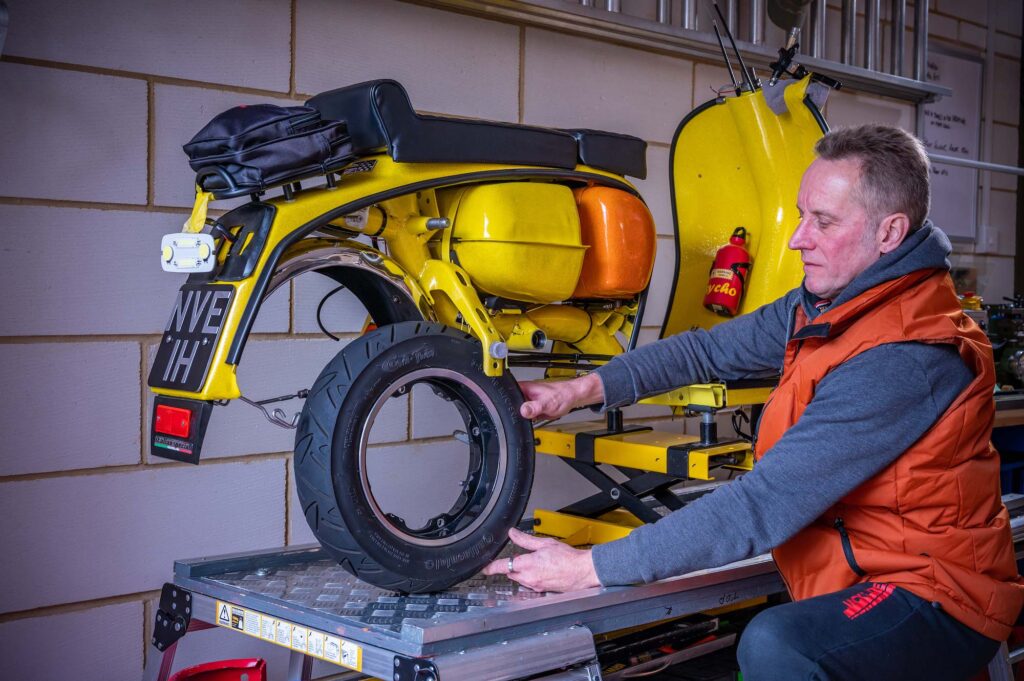 Working on NVE 1H
Working on NVE 1H
“I think I’m going to be buried with that Lambretta. I don’t want anybody else having it!”
Racing seemed a natural progression for a man who just wanted to make scooters go faster – why not test them, and himself, on the track?
His first foray into competition was sprinting – quarter mile drag races – in 1993 with a Vespa built with help from Norrie Kerr at Midland Scooter Centre.
Taking on the Italians
“Two Italians came over on tuned-up Vespas, and I wanted to compete against them so I deliberately built a Vespa,” he says. “It was cut down with drop handlebars, a Yamaha RD exhaust, big carb, and it had already been ported by Norrie. It ran really well, or I thought it did.
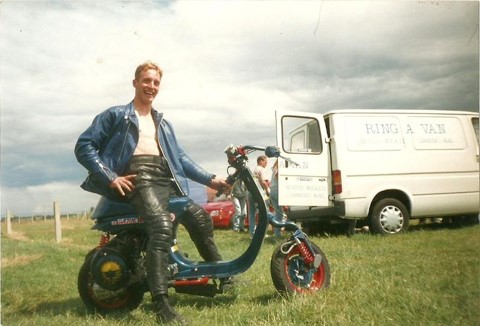 First crack at sprinting in 1993
First crack at sprinting in 1993
“But these Italians were doing 14 second quarter miles, and I was nowhere near, like 18 seconds. Oh my God, I didn’t realise.”
It was an eye-opener and, with family life taking over, Shaun didn’t compete again for over a decade, instead focusing on custom shows with a Lambretta TV200 that was eventually sold to Japan.
“I went to watch some sprinting in about 2006, and I decided to have a go again in 2009,” he says, taking part in events organised by Straightliners. “There were quite a few tuning shops at the time, like JB Tuning, AF, Chisel Speed, and they all had people who decided to have a go at sprinting. They knocked seconds off the times and the tuning developed – it was a really good, competitive time for sprinting.”
Shaun competed all over the country, from Elvington airfield to York, Stratford and North Weald, in the modified street class, which had to look like a Lambretta but could have lightweight fibreglass panels and leg shields.
“I got down into the 13 seconds, and won the 2010 street class title,” he says, clocking what was then the fastest time on a street legal scooter – 13.99 seconds and 90mph – at Elvington.
Lambretta circuit racing
Fast forward to 2017, and Shaun swapped straight lines for the twists and turns of circuit racing after watching Dean Orton’s Rimini Lambretta team in action. The team had been put together to promote Casa Performance parts.
“They had a big truck, full kit, and I went to watch – I was gobsmacked,” he says. “I thought ‘do you know what, I’m at an age now where I just want to have a go’.”
Shaun finished fifth in his first season in the Lambretta Club production class, racing at circuits including Cadwell Park, East Fortune in Scotland, Darley Moor in Derbyshire, Anglesey, and Lydden Hill.
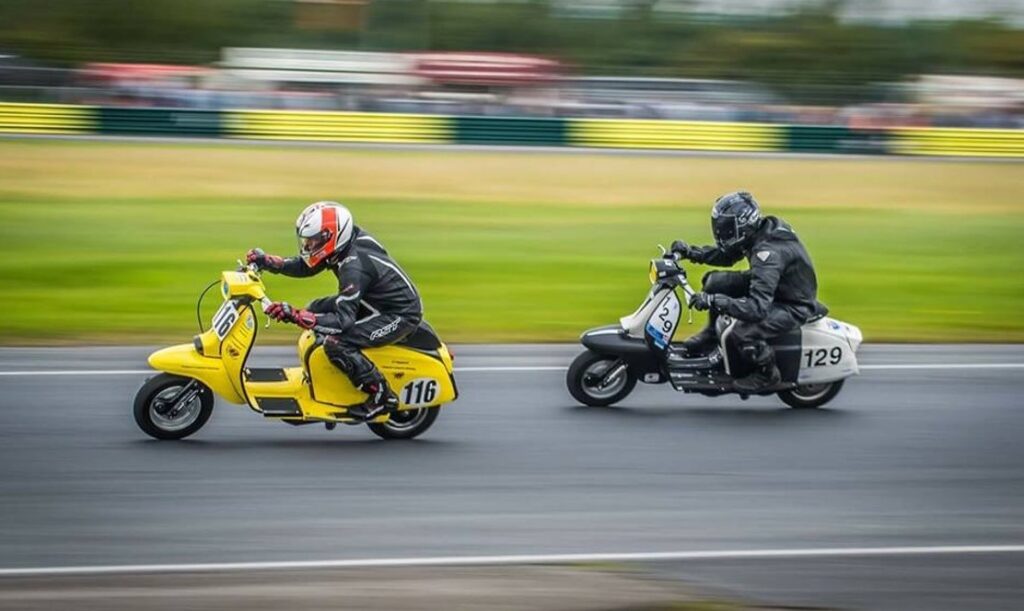 Shaun (116) in action in the Lambretta production class in 2017
Shaun (116) in action in the Lambretta production class in 2017
“Because I’d done sprinting, my getaways from the start line were always really good,” he says. “I could get by four or five people at the start.”
The following year, he took advantage of an offer to buy a race-prepped Scomadi at a discount price for a new series to promote the scooters.
“I was still a novice, I’d only done the one year, and I thought it would be a good chance for me to learn the circuits without being as bothered about crashing my Lambretta,” he says.
After a year, he sold the Scomadi and went back to Lambretta racing, building the Group 6 racer that resides in his scrupulously clean and tidy workshop.
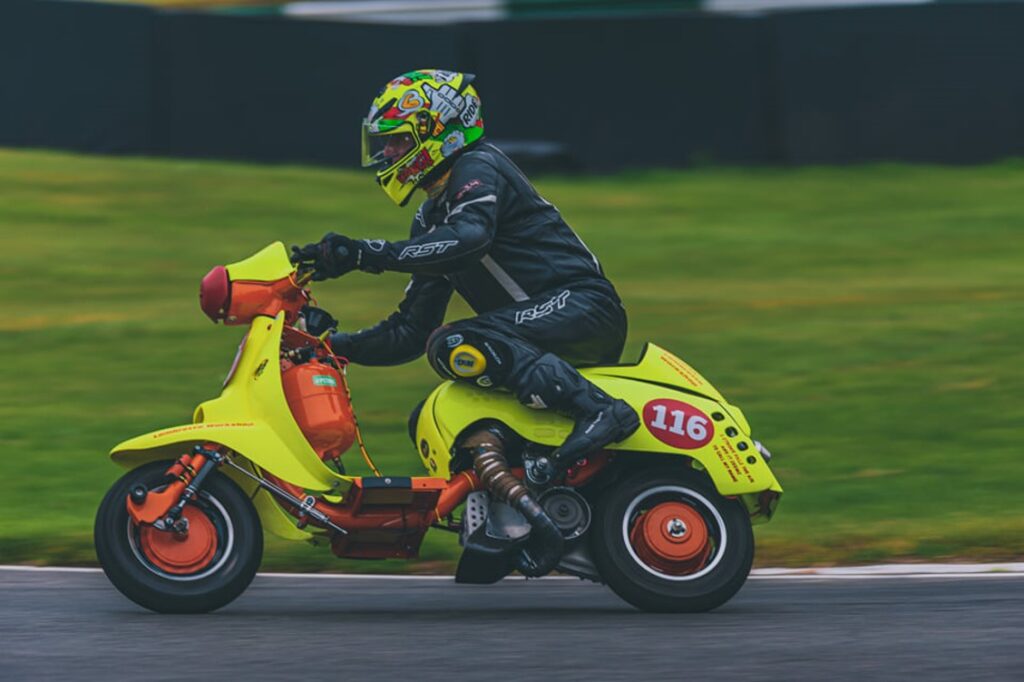
Group 6 is an almost anything goes class, allowing for extreme modifications to the engine and frame, and Shaun was in his element.
Group 6 scooter racing
“It’s the ultimate geared class,” he says, “and when I bought this scooter it was already a racer with an almost full body.”
Originally a 1972 Spanish Lambretta Li150, it’s now very much stripped back to its bare essentials, and powered by a tuned RB252 air-cooled engine.
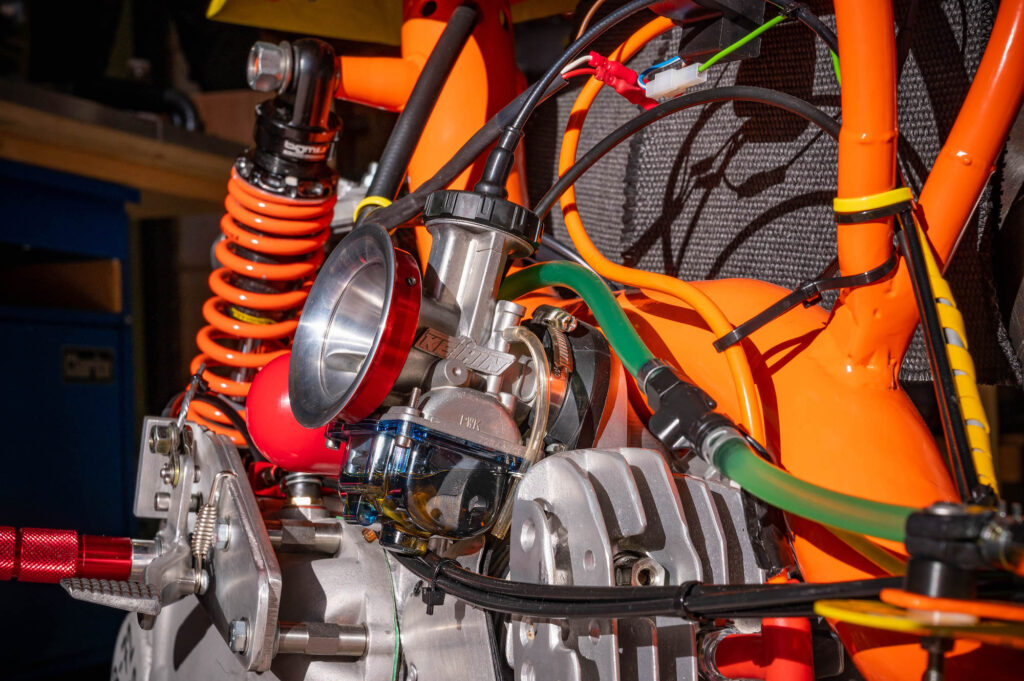
Shaun describes the 36hp it dishes out as quite “mild”.
“But it’s fast – about 105mph on the straights, which is fast enough for me at my age,” he adds.
Other modifications include a Pipe Design Hornet exhaust, BGM 4-pot disc brakes, steering damper, 40mm carb, BGM shocks all round, and Vape ignition kit.
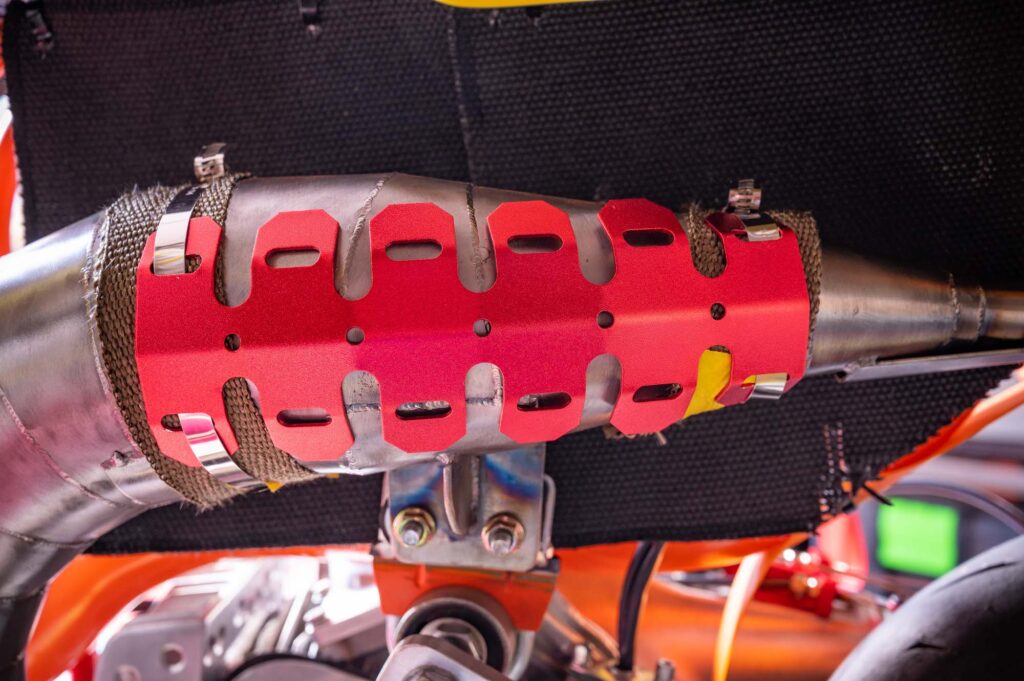
All of which costs a pretty penny, up to £5,000 on the engine and £2,000 on the frame, plus another few thousand for the other modifications.
“That’s with me doing the work and getting discounts from dealers,” he says. “What it’s worth and the cost to do it are very different. Over the last few years it’s cost me about £10,000 to build, but I’d probably only get half that if I tried to sell it.”
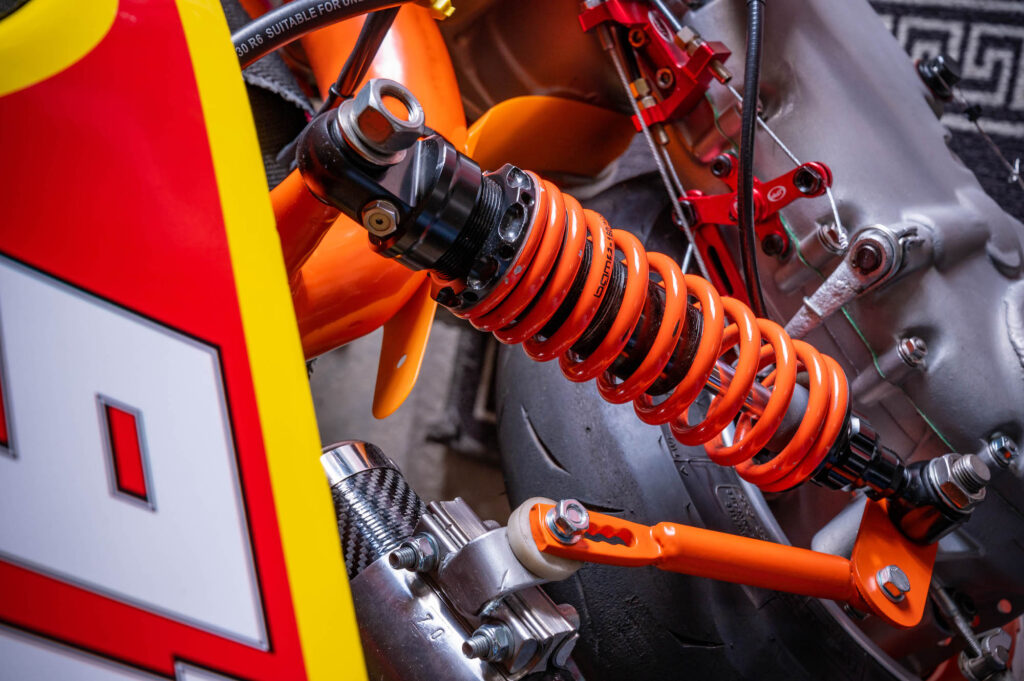
So what’s it like doing more than 100mph on a Lambretta with 10-inch wheels…?
‘The faster the better’
“I love it, I absolutely love going as fast as I can – the faster the better,” he smiles. “They jump and skip about on the corners, and I’ve had many times when I’ve been going round a bend and felt the back flip out.
“But tyres these days are so good, they get hot and sticky and grip like mad.”
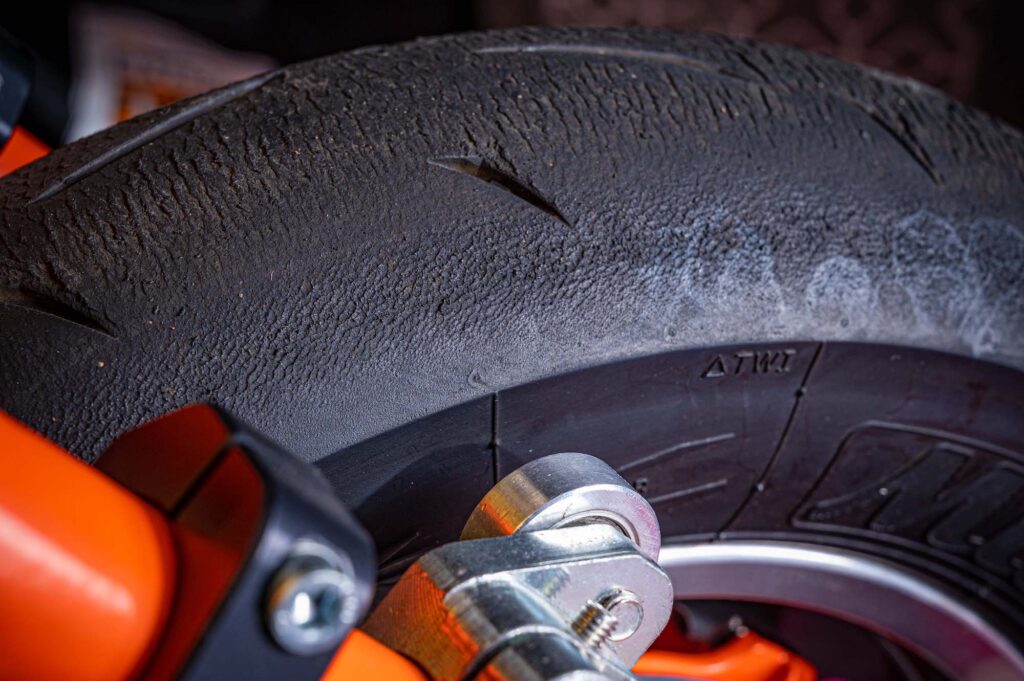 Scooter Stories, racer Shaun Fairhead. Photo credit ©Simon Finlay Photography.
Scooter Stories, racer Shaun Fairhead. Photo credit ©Simon Finlay Photography.
Those hot and sticky tyres came to the fore in his best result to date, a second-place finish when he boldly elected to run dry tyres when everyone else chose wets.
“It had been pouring with rain and everybody was panicking and putting wet tyres on, but I could see a dry patch on the track forming,” he says. “I waited and waited and we were called, and I went out on my dry tyres.
“Half way through I was catching everybody up because the full wets will go off if you haven’t got a fully wet track. They get too hot and lose all control.
“I was catching Justin Price, who’s a really good racer, and the next minute he went off into a field, and then I was catching the leader. Another lap or two and I’d have caught him.”
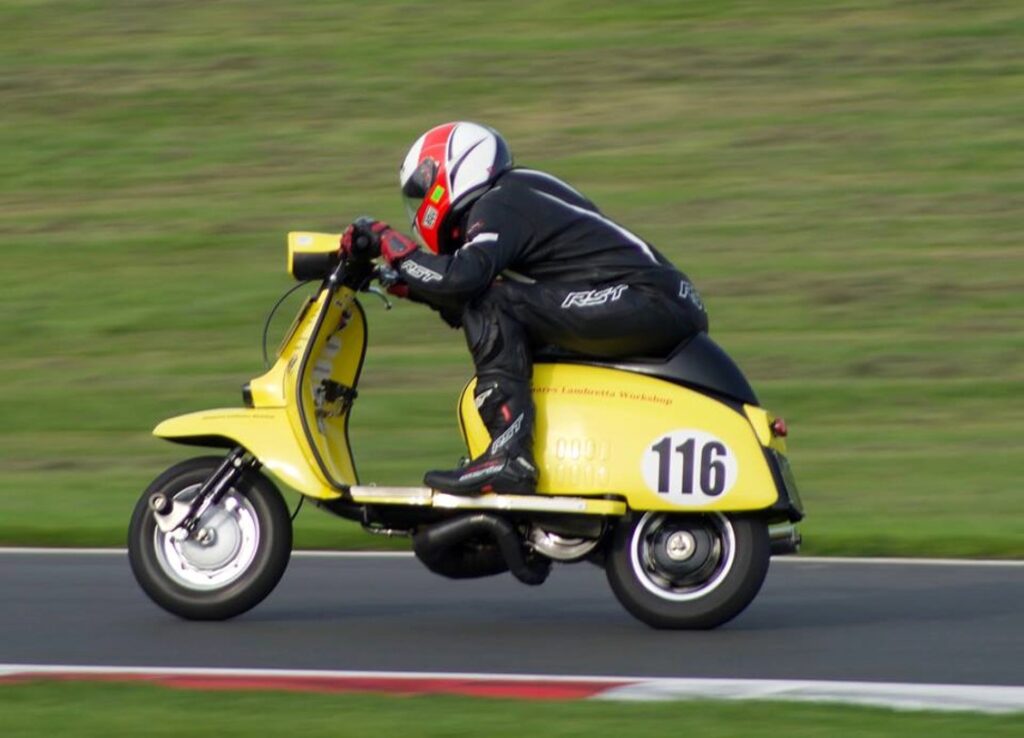
Things weren’t always plain sailing, though, and Shaun has curtailed his circuit racing after a bad accident before a six-hour endurance race in the North East.
“In practice on the Saturday one of my teammates, Eric Cope, went out on the scooter and did a couple of laps,” he says. “He came in and said ‘there’s something with this, it’s all clonking on the front end’, so I jumped on it and said ‘I’ll have a go and see what’s wrong’.
Multiple injuries
“At the second corner, I touched the brake and it threw me off. I broke my collar bone, ribs, scapula, and generally did a lot of damage.
“That put me off a bit, so I only do a couple a year now in the summer, when the weather’s nice and I know the track’s going to be dry. I’m a bit reluctant now that I’m getting older to give it my all on a circuit.
“I’m a bit competitive and I can say I’m going to be careful, but if you get on track in a group of racers and you’re battling then you start taking chances, don’t you?”
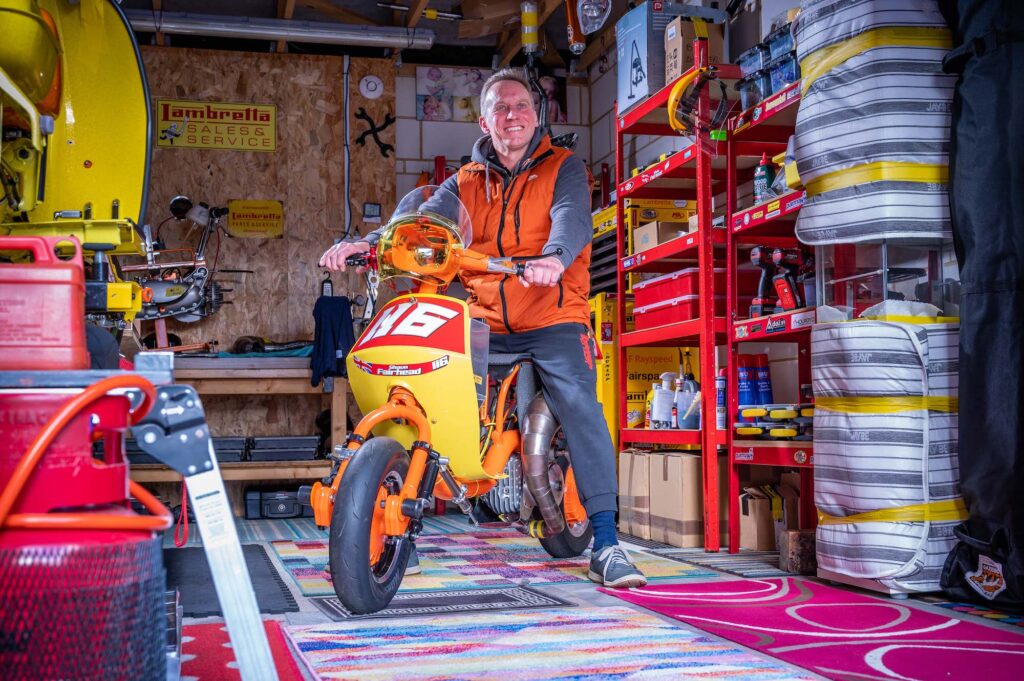
Not that he’s given up on the idea of going fast.
“I’m going to go back to sprinting, which is a bit safer,” he says, also mulling over some top speed records.
“The company I work for does fibreglass work, so I’ve asked them if they’ll make me a streamlined fibreglass full shell to try and get some records for top speeds.
“I’m hoping to do it next year, most likely at Elvington, which has a longer runway.”
As well as the racing, Shaun still does a couple of scooter rallies most years, and still builds engines, tuned of course, for Fairspares customers.
“Scooters have been my life, and I will carry on doing it until the day I die,” he says.
Scooter stories is a series of articles exploring the lives and experiences of scooterists and collectors. Click on the Scooter Stories category link to read more.






